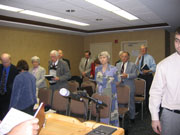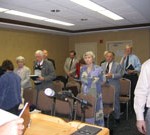
We previously asked the question, “Who is the church service for – believers or unbelievers?” (See Part 1 and Part 2). We saw that depending on how you answer that question determines whether you are going to focus on teaching believers or reaching out to unbelievers (aka seekers) in your “church service.”
However, statistics and surveys reveal that in general, disciple-making churches don’t turn out very good disciples, and seeker-sensitive churches tend mostly to attract Christians from other churches. So both approaches are failing in both discipleship and evangelism.
I suggested that the solution to this dilemma is to ask different questions. First, What is church? and second, What is the church service? With basic answers to these questions, we can now see that the only time “church service” is happening is when a group of believers (the church) are actually meeting the needs of someone else (serving), whether these needs are spiritual or physical. To be balanced, a church should focus on both spiritual and physical needs.
So what is the answer to the question, “Who is the church service for?”
The Church is for anybody that that the church is serving.
So while a group of believers could meet together for prayer, Bible study, and fellowship, this is only part of “church” for such practices only serve spiritual needs. As a group, they might want to also go out and put into practice what they have learned in Scripture to meet the physical, emotional, and psychological needs of others in the community.
They could do this all on one day, or split it up during the days of the week, or even alternate weeks. This will work best when the same group of believers that learns together goes out and serves together as well. Such service doesn’t even need to be a part of the church program, but can also be a simple part of living life among other people.
Other than these few things, I cannot find any clear and consistent guidelines in Scripture on when the church is supposed to meet and/or what they are supposed to do when they meet. See this series on the church service for where I discuss this in more detail.
Also, if you want to learn more on how to actually serve people in the community, try my book Put Service Back into the Church Service.




I’m enjoying reading the thoughts you have here regarding what God really meant “church” to be. I first started thinking about this issue a few months ago when a family friend gave us a pamphlet by a man named Mark Frees titled “Is the One-Pastor System Biblical?” Here is a link to the article online, if you want to read it. http://cnview.com/churches_today/is_the_one_pastoral_system_scrip.htm
I think Mark Frees makes some very good points in this article, and it opened my eyes quite a bit to some of the problems churches have today and why, but I have to say I don’t completely agree with the conclusion he seems to come to. While I agree that the Bible doesn’t teach that God’s blueprint is for a one-pastor system only, I know that God can still use a church with just one pastor, as there is no such thing as a perfect church, and God obviously uses hundreds of churches all over the world to spread His Word, and to serve others.
Mark Frees himself was once a pastor of a non-denominational church, but came to the conclusion that the one-pastor system isn’t Biblical while doing a study of the church in order to teach it to the congregation. I don’t know what happened, or why he left, but he is no longer the pastor at that church, and I believe has since joined a “Plymouth Brethren” congregation, though they don’t use that name themselves. The Brethren are a group that I have been studying quite a bit as well, as I really like the set up they have in their churches, but like I said earlier, I don’t think that the system they have is the only way God can use His children. But either way, the Plymouth Brethren from over a hundred years ago and since have given us many valuable writings, and the writings of C.H. Mackintosh especially have been very encouraging to me as I learn more about the LORD. (I would also recommend this site: The Biblical Resource Database, for hundreds of articles and resources regarding almost any Biblical subject imaginable. Regardless one’s personal convictions regarding God’s plan for the church, it is an invaluable resource.)
Many Blessings (and sorry for writing so much.)
~Amanda
Amanda,
Thanks for the links. I am familiar with the Plymouth Brethren and think that in some ways, they are right on, but are way off in many other areas.
But that’s true with everything. I know I’m way off in areas, and pray daily that I learn about these areas before I damage too many minds.
That site does appear to be a good resource. Thanks.
Jeremy,
But that’s true with everything. I know I’m way off in areas, and pray daily that I learn about these areas before I damage too many minds.
Very good point. I know the same is true with me, and I pray everyday for the LORD to give me more understanding, but I’m also thankful for these shortcomings as well, in both myself and in other people. It helps me keep my eyes on Christ, and reminds me to not put any one person or any specific teaching or doctrine on a pedastel, because no one is perfect. I can agree with someone or a doctrine on one thing, but that doesn’t mean we need to agree on everything else. (Is that even possible?)
And I’m glad you can use the links, if anything, they make a person think. 🙂
Church service – which is, properly speaking, the Lord’s Supper – is a time of mutuality for Divine Persons and the worshipping Christians. It is a love matter. As stated elsewhere, Christianity is entirely a spiritual system – the Lord’s word is that “God is [a] spirit, and must be worshipped in spirit and truth.” Christianity precludes any activity or expression of the natural mind.
Of course, there are other occasions in which Christians could properly be gathered – for prayer, for the Gospel, for Bible study, etc.; however, these gatherings are not the same as the Lord’s Supper and don’t carry the same worshipful circumstances (of course, Christians should always be worshipful of God – as should all men).
Jeremy, I love you in the Lord, brother; but, I am considerably dismayed – if your photo is accurate and current – as to your long hair. See 1 Corinthians 11:14